TL;DR
- pyOpenSci had a strong presence at PyCon US this year. I hope this continues for years to come! We held an open space, helped run the Maintainers Summit (lead by Inessa Pawson for 5 years and counting), gave a talk on Python packaging and ran a 1 day sprint where over 16 people contributed to our efforts.
- pyOpenSci’s theme this year for PyConUS was people first: people first when trying to make technical concepts easier to understand, people first when trying to write good tutorials or documentation and people first when you are trying to solve the world’s hardest problems.
- Giving a talk on packaging at pyConUS triggered every ounce of the imposter in me. But in the end it was a rewarding experience. Having friends in the audience made a world of difference. It was calming to focus on people who I know support both me and this vibrant organization. Friends really should never let friends…package…or use Python…or do anything technical…alone.
Another year, another incredible PyCon
Wow! I wasn’t sure it would be possible to top last year’s PyCon US 2023 experience in Salt Lake City, but this year’s PyConUS 2024 was even better. People are learning about pyOpenSci. The community is excited to support our mission to help scientists create better software and make their science more open and reproducible so they can tackle the world’s greatest challenges.
PyCon US, run by the Python Software Foundation, is one of the biggest Python meetings in the world, with a record 2,700 registrations this year.
I also knew that I’d get to see a bunch of the friends who I met last year. I was returning to this inclusive community, filled with Pythonistas like me who care, who want to learn, and most importantly who want to help each other.
And…thanks to our incredible Community Manager, Jesse (@kiersi on GitHub), we now have a pyOpenSci visual brand – and stickers galore.
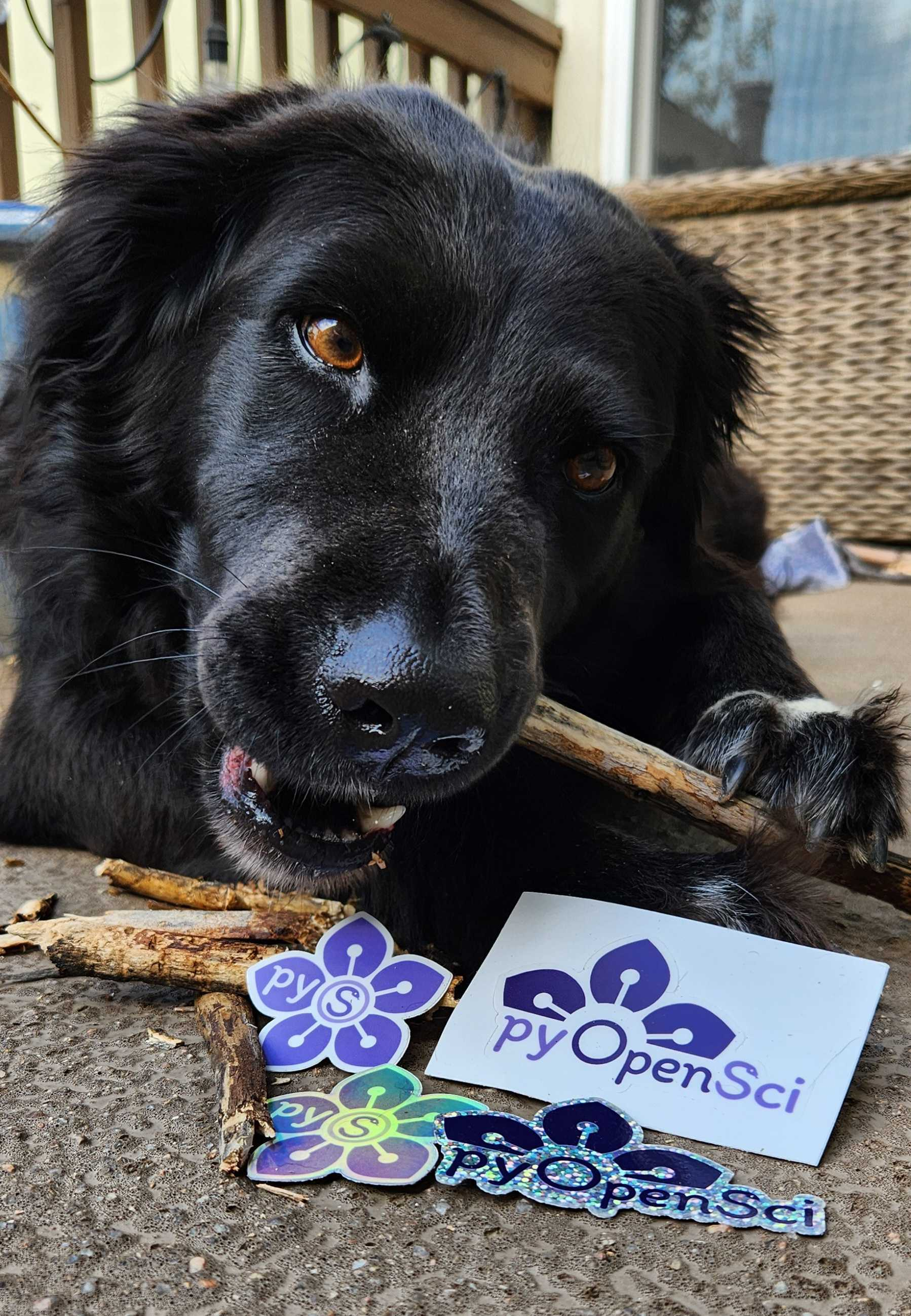
So different from last year
My experience last year was a bit different. I walked into my first PyCon US having no idea how I’d fit in at the meeting. I didn’t know many people. I had never led a mentored sprint. And I wasn’t sure how my packaging talk, Friends Don’t Let Friends Package Alone would be received; you see, packaging is a notoriously thorny topic.
Last year turned out pretty great - read more here.
However, rather than feeling like an outsider, I met a lot of new people who became new Python friends and colleagues. I learned about a lot of cool projects and organizations and our sprints were awesome with many new contributions. Yaas!
My takeaway: if you are considering going to PyCon but are worried about not knowing people YOU SHOULD STILL GO! You can feel the true spirit of open source (and open science) at PyCon US. No judgement. All “levels” of Pythonistas welcome.
My first main track PyCon US talk: Friends don’t let friends package alone
This year, I gave my first main track talk at PyCon, titled “Friends Don’t Let Friends Package Alone.” Getting a main track slot means presenting on a big stage to a huge room of people! It was real - headset mic, incredible tech support, and even an “escort” from the speaker room to the main stage. Wow!
You can check it out on youtube below:
Speaking of friends, it was my friends who got me through this talk. I saw them sitting in the front rows, smiling and supporting me. They both empowered me and gave me calm.
As someone who often battles imposter syndrome, giving a talk on the “big” stage of a tech meeting was unforgettable.
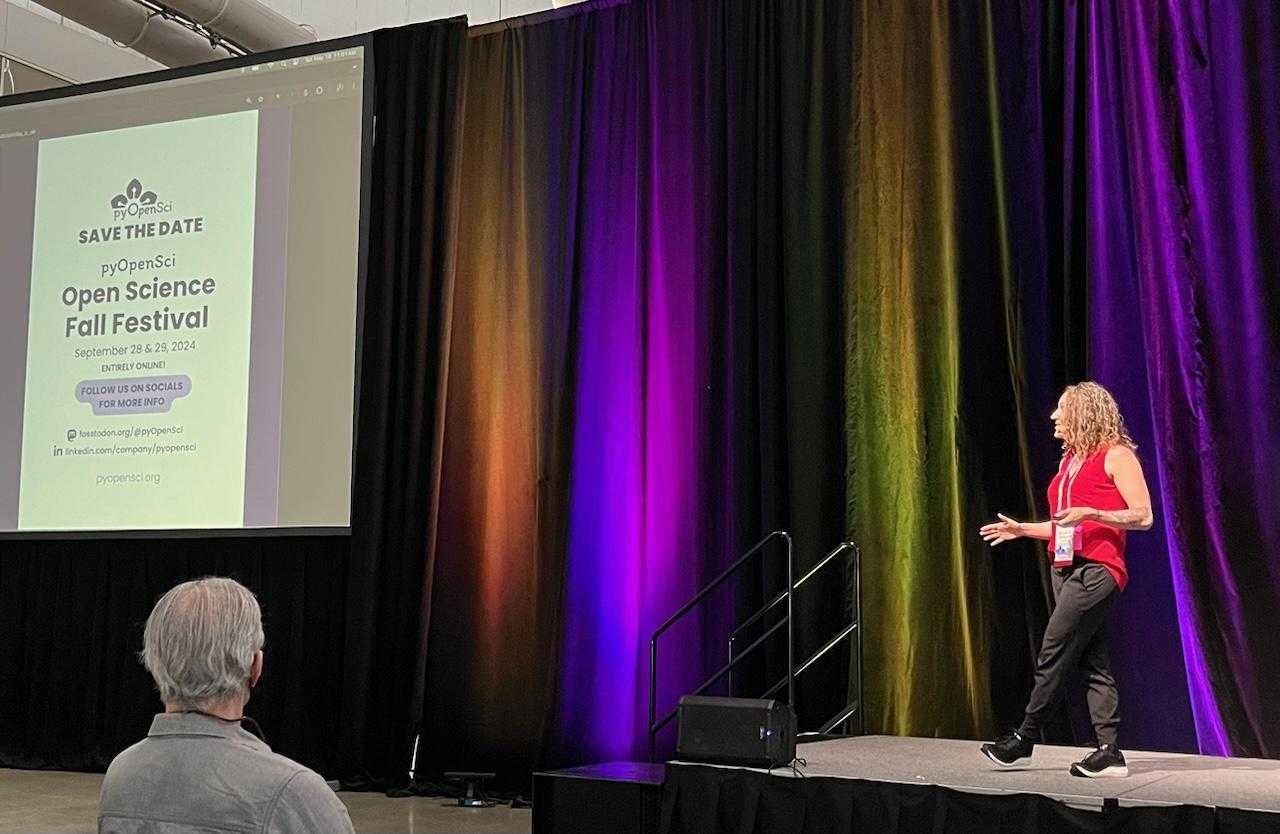
A talk about making Python packaging more beginner friendly
My talk focused on how pyOpenSci helps beginners by breaking down complex packaging concepts into simple, digestible pieces. I leaned into decades of experience and study of teaching data science to various audiences, from big-ten university students to students at under-resourced and under-served tribal colleges. The essence of my talk was about the importance of community and collaboration in the thorny Python packaging ecosystem, and also why documentation should focus on fundamental concepts that users need to understand, rather than tools.
Our pyOpenSci community has created a comprehensive, beginner-friendly Python package guide with contributions from over 50 community members. Key takeaways from my talk:
- leverage community support,
- create early wins for users, focus on fundamental concepts, and
- avoid “Too Many Options and Opinions” (TMO) to keep things simple for beginners.

Giving a talk at PyConUS experience reinforced my belief in the power of community to tackle complex problems and support each other in our scientific journeys.
The PyCon US maintainers Summit
This year, I had the honor of helping Inessa Pawson and Kara Sowles organize the PyCon US Maintainers Summit 2024, an event that has grown from an experimental “hatchery” to its 6th year at PyCon US. Last year, I had the privilege of giving a talk at the summit. This year, I co-organized, learning the ropes of proposal calls, speaker selection, and navigating a summit that filled a room of 80 people within a conference boasting 2,700 registrations. The prep leading up to the summit was manageable, but the days before and the day of were quite the adventure!
The summit featured amazing speakers, including:
- Leonard Richardson, who shared insights on maintaining core tools like Beautiful Soup for 20 years and tips on handling burnout.
- Jessica Tegner. Jessica became a maintainer of one of the top 1% of all downloaded packages on PyPI - pypandoc. She talked about her experiences taking over a package with over 3 million monthly downloads. Oh and did I mention that Jessica does all this while being visually challenged? The backgrounds (and dedication) of the maintainers in our open source ecosystem always blows my mind.
Working alongside Inessa Pawson, Kara Sowles and Chris Rose who are all also rockstars in the open source world was a fantastic experience. Despite some logistical challenges, like the summit filling up quickly and a waitlist, the event was a success. Next year (if we are invited back), will be even better as we try to open the doors to include aspiring maintainers and contributors!
Also if you were wondering, yes that Monstera Deliciosa (plant) in the background is real! AND YES it is ginormous!
Our second pyOpenSci sprint
This year we had a tremendous turnout of over 20 people from several countries for our 1-day pyConUS sprint. At last count this resulted in about 30 issues and pull requests where volunteers who were there to support scientists, helped us fix issues on our website, in our tutorials and our packaging and peer review guidebooks. So many long-standing issues and bugs were fixed thanks to this wonderful Python community.
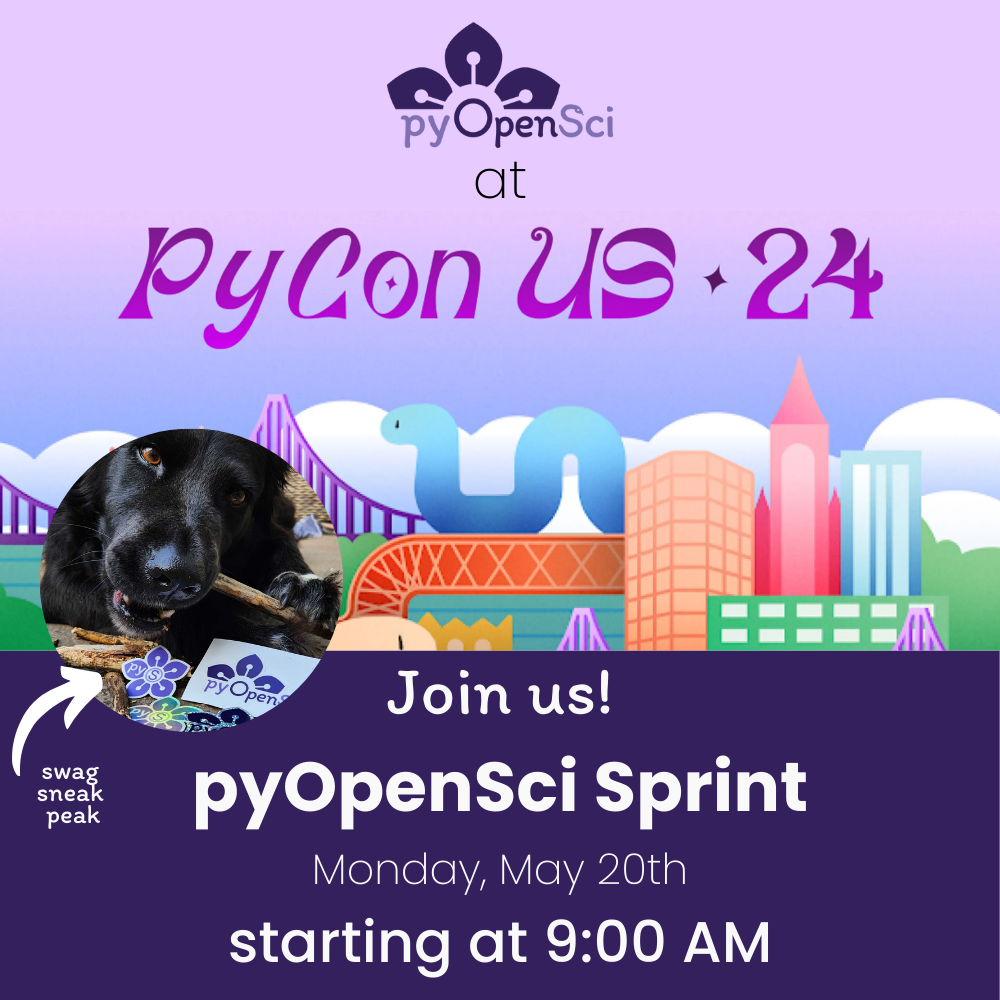
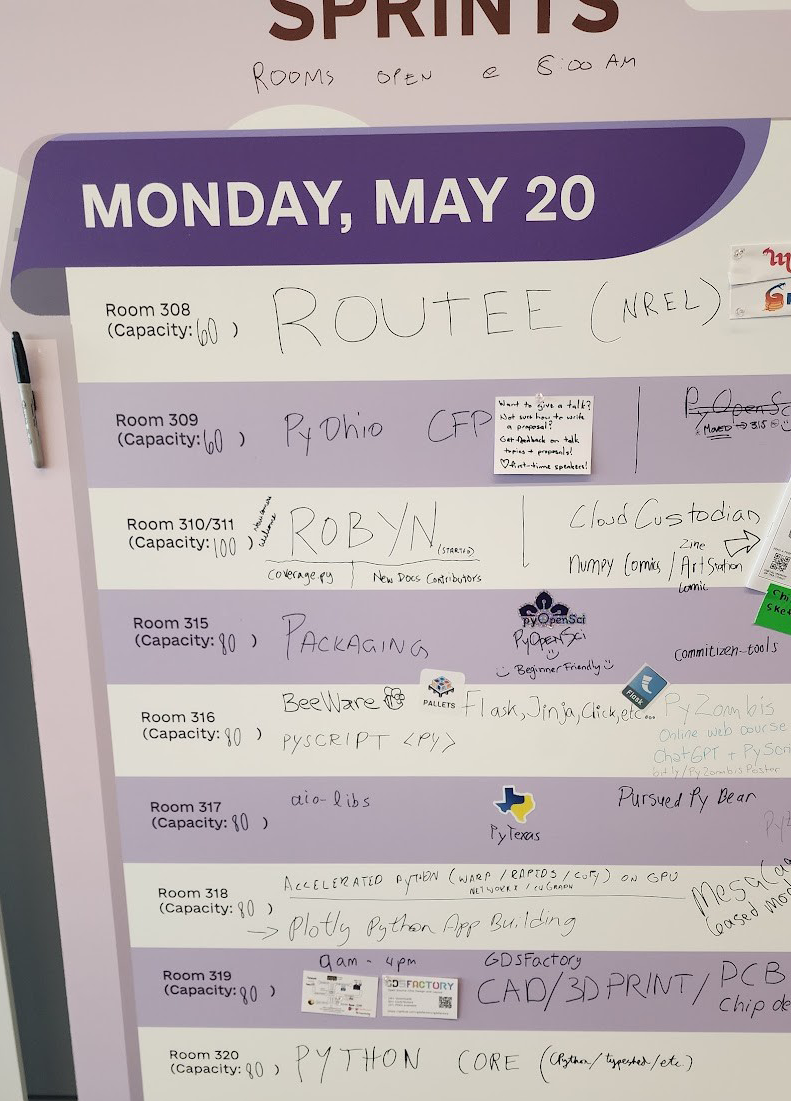
If you haven’t been to a sprint before, it’s an experience that every open source enthusiast should have. Sprints are where a bunch of people come together to work on a project. If you are running sprints that support software development in a professional environment (i.e. at a company) this might mean a team of people working together on releasing a new software feature. But for the open source community, sprints can also mean volunteers coming to a space to help maintainers work on various parts of a project that they care about - like pyOpenSci!
pyOpenSci supports other people’s software through it’s open community-lead peer review process and it’s online, free packaging resources. But it also has it’s own software too. We have tools that help us keep track of our review process and volunteer contributions so we can acknowledge everyone for their effort.
Acknowledging contributions is so so so (did I mention SO?) important. And we value them so much.
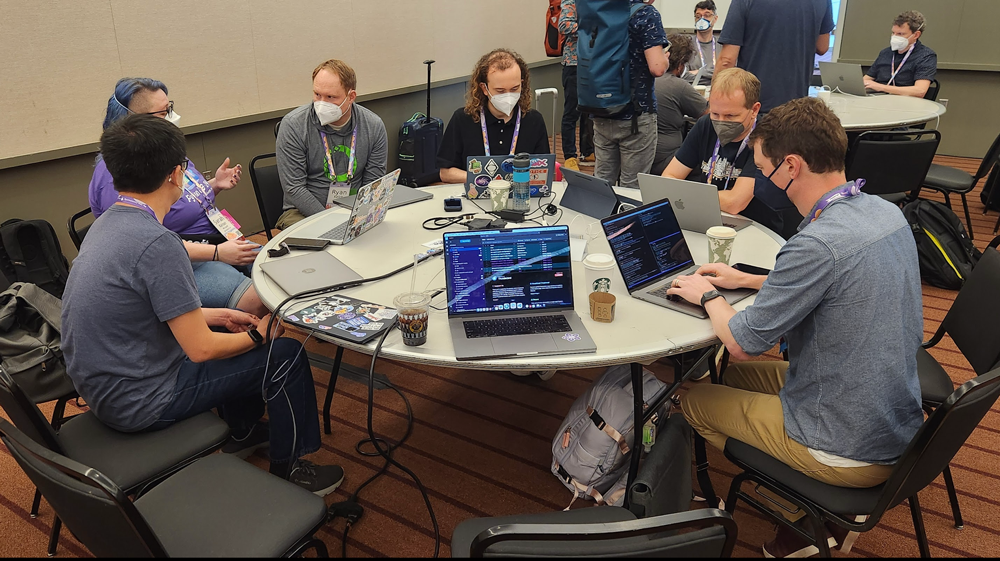
How to run a sprint
I’ve learned a lot about running sprints over the past 2 years. At pyOpenSci, we have a help-wanted project board where we add issues and things that we could use help with across our organization. Some of the tasks that we need help with are beginner friendly. For example it’s useful for beginners to test drive our online packaging tutorials and then report bugs as GitHub issues. Your feedback might be errors in a lesson, typos or things that were confusing / didn’t work.
Some of our help-wanted issues are more technical too. pyOpenSci is a non-profit organization whose heart is a community of volunteers. We have infrastructure that any other open source project would have, and as such we need technical help working on CI (continuous integration) workflows, guidebook infrastructure, our website and more.
As an Executive Director and Founder of pyOpenSci, I created most of this infrastructure to support our mission myself, early on. This means that sometimes, its not the prettiest code . But it works.
While I cherish times when I have bandwidth to work on technical things, it’s hard to keep up. So I really appreciate when community members can help us tick off open issues - big and small.
Our first pyOpenSci PyCon Open Space
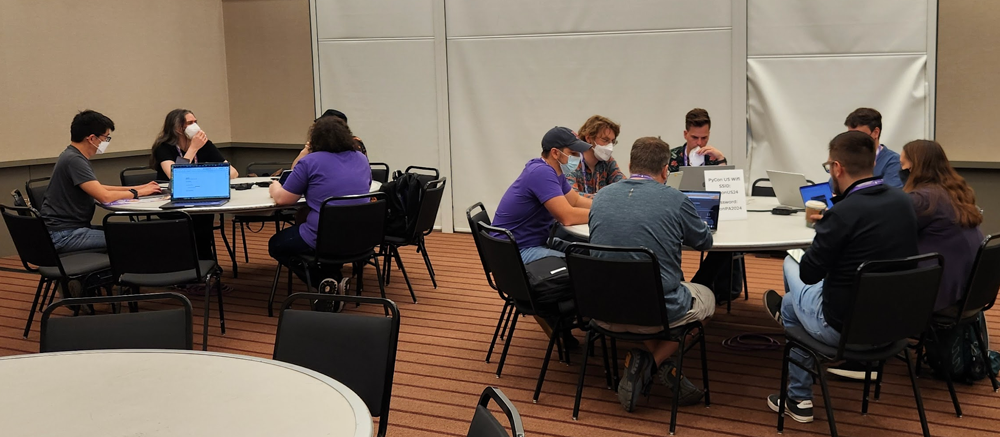
This year, we ran our first pyOpenSci Open Space, bringing together 17 attendees from organizations like Anaconda, NVIDIA, CPython, PyPA, Million Concepts, CapitalOne, Moderna, and MongoDB. Our discussions spanned interoperability, scientific data workflows, and Python packaging for science. We focused on the importance of consistent tools and data formats, reducing cognitive load for scientists, and maintaining backwards compatibility. Key takeaways included the need for shared data formats, simple reproducibility practices, and opinionated packaging guides.
A topic that came up a lot was the gap between exploratory code / scripts and fully packaged / published code. There is a need for more “in between” options that support scientists sharing their code and code outputs.
The discussions in this year’s open space gave pyOpenSci much to consider moving forward. The complexity and diversity of tools in scientific computing can create significant cognitive load.
We need consistent and straightforward tools and workflows that allow allowing scientists to focus on their research rather than tools. We plan to tackle some of these and other topics during our Fall festival on September 28-29, 2024 so save the date and come ready to learn and share!
Packaging summit
Last but not least, pyOpenSci had a strong presence at the PyConUS packaging summit this year. The summit was organization by Pradyun Gedam, Jannis Leidel, CAM Gerlach, Filipe Laínes. As I have mentioned several times, packaging is one of the more thorny topics in our Python ecosystem. However, this year, things felt different compared to last.
For one, there were a lot more people in the room, and people with different perspectives. For starters, last year I was 1 of 3? female-identifying people in the room - this year there were people from many backgrounds and identities in the room! Last year also felt more technical whereas this year was a perfect mix of discussing technical topics combined with a strong theme of considering user experience in both installing Python and creating packages. PLUS - documentation - yes PLEASE!
The Executive Director of the Python Software Foundation was in the room and shared that there could be financial support in the future to make packaging better!
I’m hopeful.
From my perspective, the biggest challenges in our ecosystem revolve around:
- too much focus on tools and not enough focus on user experience and documentation, and
- too many options and opinions that prevent users from have early success.
There is a path forward. And people who are working on tools in the ecosystem really do care – a lot. So please thank them - thank the maintainers and people who work on the tools that you use - or might use in the future. It’s all volunteer time.
A few other highlights for me included meeting Ofek, the maintainer of Hatch. It was a big deal for Ofek to attend this meeting in person! He also gave a talk on his end-to-end packaging tool Hatch.
Wrap up
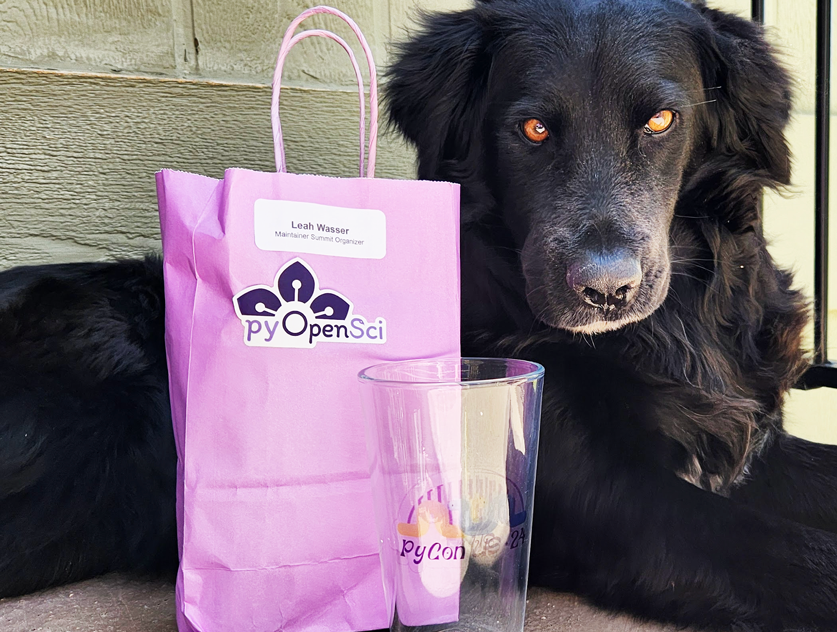
I left pyCon US 2024 overwhelmed by the support that pyOpenSci received. People at pyCon generally care a lot and are invested in making scientists’ experience in the Python ecosystem better. I also needed a week to recover. I am an introvert by nature so even the best days of interacting with friends makes me tired!
I look forward to attending the meeting again next year - once again in Pittsburgh, Pennsylvania, USA. And I look forward to seeing my newly expanded Python family again too.
See you there!

Leave a comment